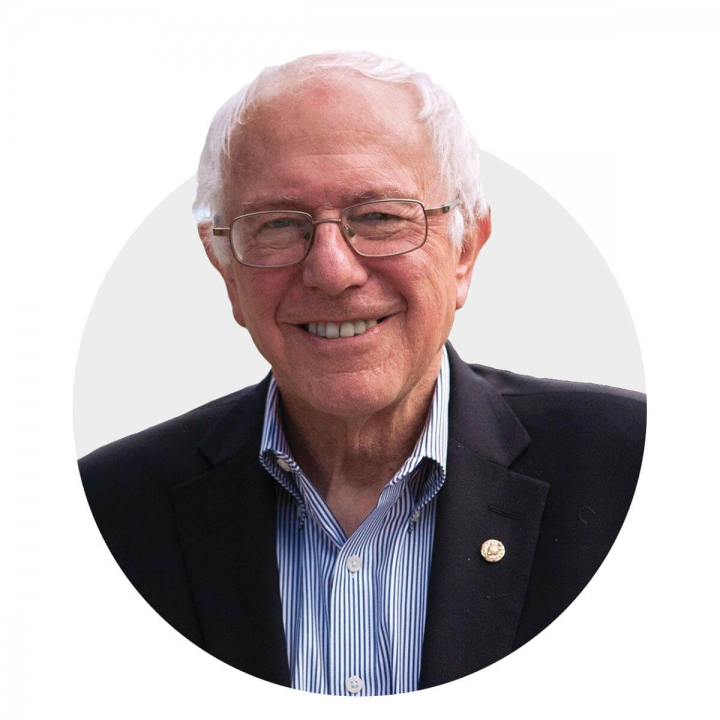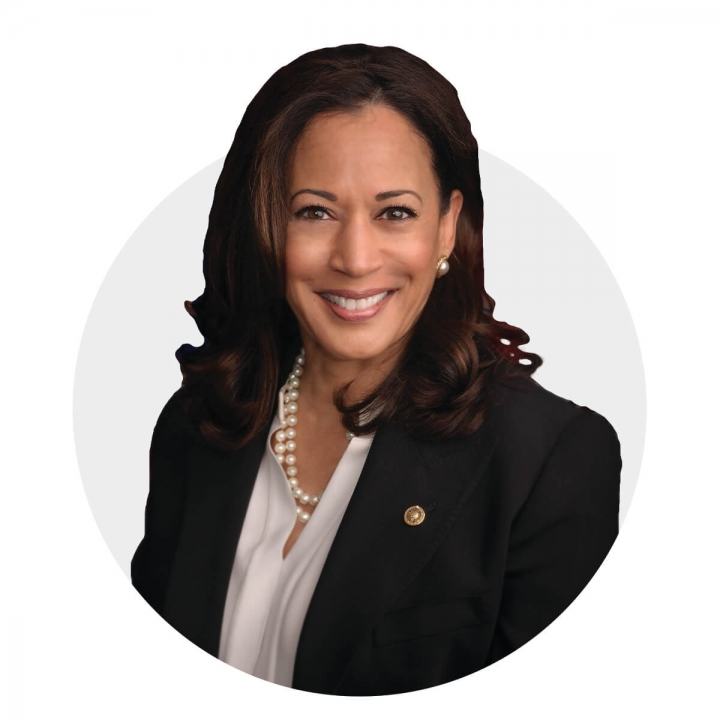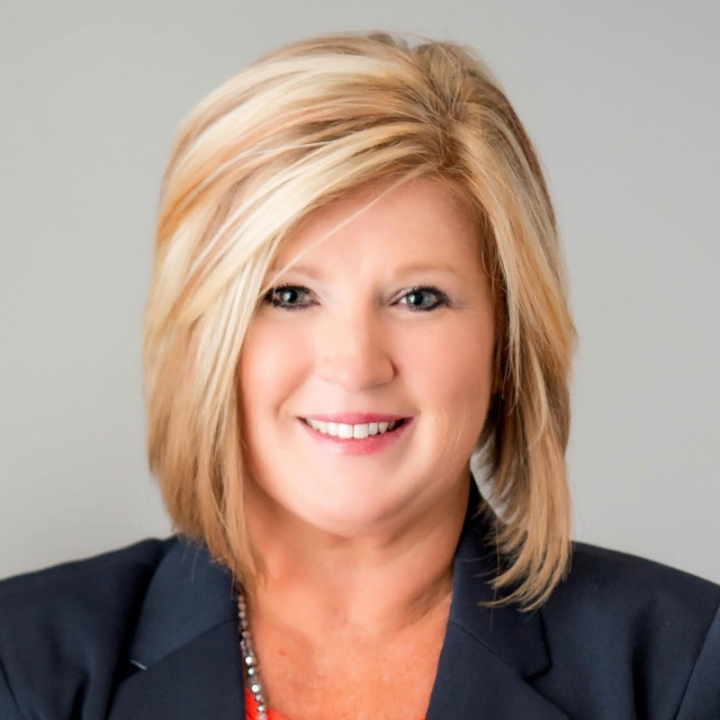Bernie Sanders on Syringe Access
Sanders supports syringe exchange programs, and would legalize them across the country.
“The disastrous policies that make up the War on Drugs have not reduced drug use and violent crime. We must use effective therapeutic, not punitive, solutions to address drug addiction.”
Amy Klobuchar on Criminal Justice Reform
Klobuchar would create a position in the White House that exists outside of the Department of Justice to advise the president on criminal justice reform issues.
Klobuchar would create a bipartisan clemency advisory board that would include victim advocates and prison and sentencing reform advocates to investigate and review requests for clemency.
As a prosecutor in Hennepin County, Klobuchar pursued harsher penalties for repeat offenses, including drunk driving, failure to pay child support, and more.
Klobuchar will direct the Department of Justice to decline to renew or reduce the scope of contracts for private prisons when the contract reaches its end, aiming to phase out the use of private prisons.
Klobuchar previously served as a prosecutor for Hennepin County in Minnesota.
When data showed that a local drug court in Hennepin County was sentencing many drug offenders to probation instead of prison, Klobuchar called the results “unacceptable,” adding, “We believe that they should serve a lengthier sentence instead of going to the workhouse and that they should be behind bars.” Klobuchar was a prosecutor in Hennepin County at the time.
Prosecutors criticize Drug Court
Star Tribune, July 13, 2006
Read More
Klobuchar: On criminal justice reform, it’s time for a second step
CNN, April 5, 2019 | Amy Klobuchar
Senator Amy Klobuchar Releases Plan of More Than 100 Actions for Her First 100 Days as President
Medium, June 18, 2019 | Amy for America
Amy Klobuchar’s record as a “tough on crime” prosecutor, explained
Vox, February 25, 2019 | German Lopez
Amy Klobuchar on Overdose Prevention Sites
Klobuchar has not issued specific statements to this issue
Amy Klobuchar on HIV Getting to Zero
Klobuchar has not yet completed a survey about HIV policy issued by AIDS United
2020 Presidential Candidate HIV Questionnaire
AIDS United, 2019
Klobuchar supports increasing competition and regulation of pharmaceutical companies in order to improve the availability of affordable HIV medications.
Klobuchar supported increased funding for Housing Opportunities for Persons with HIV/AIDS as Senator for Minnesota.
Klobuchar pledges that within the first 100 days of her presidency, she will allow for the safe importation of prescription drugs from other countries to decrease drug costs and would crack down on drug companies that pay makers of generic drugs to delay cheaper versions from getting into the market.
My solutions are these: first of all, make sure that [the] HIV community can get the drugs that they need, and that means the PrEP drug, and that means a whole bunch of other things to take on pharmaceutical companies to make drugs more affordable, including PrEP. The second thing is to make sure we keep in place the protections of the Affordable Care Act so we don’t kick people off their insurance for pre-existing conditions… The third thing that I would do is look to general social issues like homelessness, and things we need to do a much better job of… And finally, it’s the stigma issue.”
Klobuchar calls out big pharma to lower HIV drug costs
CNN, October 11, 2019 | Don Lemon
Read More
BREAKING: 2020 Presidential Candidates Tell Us Their Plans to End HIV
HIV+Magazine, September 9, 2019 | Jacob Anderson-Minshall
2020 Presidential Candidate HIV Questionnaire
AIDS United, 2019
Senator Amy Klobuchar Releases Plan of More Than 100 Actions for Her First 100 Days as President
Medium, June 18, 2019 | Amy for America
Amy Klobuchar on Hepatitis C Treatment Access
The Senate Finance Committee released a report in 2015 which revealed that the hepatitis C drug ‘Solvadi’ was being priced and marketed to maximize profits for a pharmaceutical company, and was at the expense of consumers. In response to this report, Klobuchar called on Congress to act immediately to pass legislation to lower prescription drug prices for consumers.
“It is as clear as ever: we have an urgent problem with the cost of prescription drugs in our country. This report presents yet another example in which a drug manufacturer’s first priority is how much money it can squeeze from consumers with no regard for what it means for the Americans who need its treatment. This is an alarming trend that we cannot allow to continue. We need to pass legislation to protect consumers from the unjustified inflation of prescription drug prices.”
In Light of New Report on Profit-Driven Prescription Drug Pricing, Klobuchar Continues Call for Congress to Immediately Pass Her Legislation to Lower Drug Prices for Consumers
Amy Klobuchar senate website, December 1, 2015
Read More
In Light of New Report on Profit-Driven Prescription Drug Pricing, Klobuchar Continues Call for Congress to Immediately Pass Her Legislation to Lower Drug Prices for Consumers
Amy Klobuchar senate website, December 1, 2015
Amy Klobuchar on Voting Rights Restoration
Klobuchar supports restoring voting rights to felons after release from prison.
Klobuchar reported she supported “what they did in Florida, which is when [felons] get out they get to vote.”
Candidates Are Really Hesitant About Allowing Prisoners To Vote
Huffpost.com, April 10, 2019 | Sam Levine and Igor Bobic
Read More
Candidates Are Really Hesitant About Allowing Prisoners To Vote
Huffpost.com, April 10, 2019 | Sam Levine and Igor Bobic
Amy Klobuchar on Drug Decriminalization
Klobuchar would require prescribers to use the prescription drug monitoring program.
Klobuchar would create a position in the White House that exists outside of the Department of Justice to advise the president on criminal justice reform issues.
Klobuchar would create a bipartisan clemency advisory board that would include victim advocates and prison and sentencing reform advocates to advise the president.
Klobuchar is a co-sponsor of the Strengthening the Tenth Amendment Through Entrusting States (STATES) Act, which would amend the Controlled Substance Act to exempt states that have legalized cannabis from federal intervention.
Klobuchar is one of eight senators who signed a letter addressed to then Attorney General Jeff Sessions, demanding answers about the status of applications to become federally authorized marijuana manufacturers for research purposes.
When data showed that a local drug court in Hennepin County was sentencing many drug offenders to probation instead of prison, Klobuchar called the results “unacceptable,” adding, “We believe that they should serve a lengthier sentence instead of going to the workhouse and that they should be behind bars.” Klobuchar was a prosecutor in Hennepin County at the time.
Prosecutors criticize Drug Court
Star Tribune, July 13, 2006
Klobuchar supports incentives for state governments to enact ignition interlock laws for those convicted of drunk driving. These laws often also impact individuals convicted of substance use related charges, including those that do not involve a driving incident.
Klobuchar is a co-sponsor of the First Step Act, to reduce federal sentences for non-violent drug offenders.
Klobuchar signed on to measures designed to expand research into marijuana by increasing the number of facilities permitted to cultivate cannabis for research purposes and require relevant federal agencies to reassess whether cannabidiol (CBD) should remain a controlled substance. Another proposal she cosponsored would remove CBD and “CBD-rich plants” from the definition of marijuana under federal law.
Klobuchar has not signed onto the far-reaching Marijuana Justice Act that Sen. Cory Booker filed to deschedule cannabis and withhold funding from states with discriminatory enforcement.
Her Senate website contains just one mention of marijuana policy: “Finally, I have opposed efforts to roll back the Obama Administration policy that the federal government would not interfere with state laws legalizing marijuana, and I cosponsored the STATES Act, bipartisan legislation introduced by Senators Elizabeth Warren and Cory Gardner to protect the ability of states to regulate marijuana,” she said. “I have also cosponsored legislation to make it easier for researchers to study the medical effectiveness and safety of marijuana and cannabidiol, which is used to treat conditions such as epilepsy.”
“I support the legalization of marijuana and believe that states should have the right to determine the best approach to marijuana within their borders.”
Amy Klobuchar says she supports legalizing marijuana
CNN, February 22, 2019 | Dan Merica and Sophie Tatum
Read More
Klobuchar: On criminal justice reform, it’s time for a second step
CNN, April 5, 2019 | Amy Klobuchar
Amy Klobuchar has a plan to reverse the war on drugs – and doesn’t need Congress to do it
Vox, April 30, 2019 | German Lopez
Amy Klobuchar on Substance Use Treatment Access
Klobuchar’s proposes $100 billion to combat drug and alcohol addiction and to improve mental health care. Klobuchar references her dad, who is in recovery from long-term alcohol
Klobuchar would increase funding for addiction and mental health programs, and would increase the number of beds in mental health and substance use treatment centers, especially in rural areas, and especially in areas hit hardest by the overdose crisis.
Klobuchar would expand Certified Community Behavioral Health Clinics and treatment facilities.
Klobuchar would more strictly enforce the requirement of the Affordable Care Act that insurers cover mental health care.
Klobuchar will “make a major investment” into research and development of pain management alternatives to opioids.
Klobuchar would permanently repeal Medicaid’s “IMD Exclusion,” which prohibits Medicaid reimbursements for those receiving mental health or substance use care in facilities with more than 16 beds.
Klobuchar plan to address substance use includes funding for mental health programs at schools, as well, training for healthcare providers to recognize early warning signs of addiction and other mental health conditions, and school and community drug early-intervention programs.
Klobuchar would support public and nonprofit entities dealing in substance use treatment.
Klobuchar would increase funding for early intervention and treatment programs for drugs including cocaine and methamphetamine.
Klobuchar would increase the numbers of job training programs, transitional housing programs, and other social services for individuals in recovery.
Klobuchar will work to improve the unused prescription disposal options. In 2010, Klobuchar led the passage of the first major expansion of federal drug take-back programs with the National Prescription Drug Take-Back Day campaign.
“I want other people to be pursued by grace. I want them to have the ability to get through this [addiction], and sometimes you can’t get through it the first time, and that includes people who are addicted to very difficult substances to get through – opioids, heroin now, that is out there more and more than we ever could have imagined, what we’re seeing with meth. Those are drugs that people are affected by in every community in this country.”
Klobuchar releases plan to treat substance abuse, mental illness
NBC News, May 3, 2019 | Ali Vitali and Kailani Koenig
“I think every American should have that right to be pursued by grace. That means enough beds in this country for people with mental health problems if they’re facing a crisis. That means doing something about our mounting suicide rate – for farmers, for veterans, for LGBTQ youth – and that means instead of just talking about this, actually putting the money into treatment. I have a proposal that’s paid for by yes, two cents per milligram fee on these opioid pharma companies that have made tons of money off the backs of people who got addicted, and you can use that money for not just opioids, you can also use it for these other drugs, as well as mental health. It means making sure on the road to recovery, you’ve got a job and you’ve got a place to live, and there are so many people in this country that are crying out for help.”
Klobuchar on new plan to address addiction, mental health
CNN, July 30, 2019 | Jake Tapper
“Well, the first thing I did would probably be our bigger bulk of cases was in drug court. We had very successful and have a very successful drug court, and that really is that second chance idea. That’s the idea that, yes, you could be facing jail time or prison time but its hung over your head, so you have a community, and you have treatment that helps you get through it, because we don’t like to see repeat customers in the criminal justice system. We like them to go out of the criminal justice system.”
Klobuchar releases plan to treat substance abuse, mental illness
NBC News, May 3, 2019 | Ali Vitali and Kailani Koenig
Read More
Amy Klobuchar Proposes $100 Billion for Addiction and Mental Health
The New York Times, May 3, 2019 | Maggie Astor
Amy’s Plan to Combat Addiction and Prioritize Mental Health
Medium, May 3, 2019 | Amy for America
Amy Klobuchar on Syringe Access
Klobuchar has not issued specific statements to this issue.
Kamala Harris on Criminal Justice Reform
In 2004, as District Attorney of San Francisco, Harris refused to seek the death penalty against a man convicted of shooting police officer Isaac Espinoza. She faced opposition from fellow Democrats, including Senator Dianne Feinstein (D-CA) who called for the death penalty at the officer’s funeral. Following that incident, she received almost no support from police groups during her first run for attorney general in 2010.
Harris created the “Back on Track” program which allowed first-time drug offenders, including drug dealers, to get a high school diploma and a job instead of prison time. Adams, Harris’s spokesperson, noted that the program started in 2005, “when most prosecutors were using a ‘tough on crime’ approach.”
Harris promises to end the War on Drugs.
Harris would create grant programs to provide services to those most adversely impacted by the War on Drugs, provide states and localities with funds to make loans to assist small businesses in the marijuana industry, and provide funds for programs that minimize marijana licensing and employment barriers.
Harris is a cosponsor of the Justice Safety Valve Act, which would eliminate mandatory minimums by allowing judges to issue sentences below the mandatory minimum.
Harris would remove the clemency process from the Department of Justice due to inherent conflicts of interest.
Harris would create a new National Criminal Justice Commission to study state and federal criminal justice systems.
Harris would end the use of private prisons.
Harris would work to end juvenile incarceration, life sentences of children, the transfer of children to adult prisons, solitary confinement for children, and criminal charges for school-based disciplinary behavior.
Harris would mandate that federal prisons provide educational and vocational training, and mental health and addiction treatment.
Harris supports ban the box.
Harris introduced the Fair Chance at Housing Act of 2019 with Rep. Alexandria Ocasio-Cortez, which helps to remove barriers to obtaining federal housing assistance for individuals with criminal records.
Harris would create a National Police Systems Review Board.
Harris would double the size of the DOJ’s Civil Rights Division.
Harris would end the use of fines and fees that criminalize the poor, including ending suspension of driver’s licenses for unpaid fines.
Harris would increase prosecutorial accountability and would increase support for public defenders.
Harris pledges to end mass incarceration, and invest in community-based programs to reduce crime and promote safe and healthy communities.
Harris promises to make significant federal investments into evidence-based, non-carceral social supports and programs to improve public safety and reduce violence, including investing in jobs, job training, housing, transportation, food security, education, medical care and mental health care.
Harris will legalize marijuana on the federal level and expunge marijuana convictions.
Harris pledges to invest in reducing the incarceration of women convicted of non-violent offenses.
Harris would end mandatory minimums at the federal level.
Harris would form clemency/sentencing review units to significantly increase the use of clemency.
Harris would end the federal crack and powder cocaine sentencing disparity.
Harris pledges to reform community supervision by shortening the length of probation and ending jail time for technical violations of community-based supervision.
Harris would create a Bureau of Children and Family Justice.
Harris would invest in Back-on-Track programs.
Harris would mandate that federal prisons provide a reentry educational course.
Harris would end federal bans on formerly-incarcerated and arrested individuals access to public housing, student loans, SNAP and professional work licenses.
Harris supports automatic expungement and sealing of offenses that are not serious or violent after 5 years.
Harris supports independent investigations of officer-involved shootings.
Harris would end the death penalty and solitary confinement.
Harris would reinstate President Obama’s executive order to de-militarize police departments.
Harris would end money bail.
“I’ve been consistent my whole career. My career has been based on an understanding, one, that my duty as a prosecutor was to seek and make sure that the most vulnerable and voiceless among us are protected, and that is why I have personally prosecuted violent crime that includes rape, child molestation, and homicide. And, I have also worked my entire career to reform the criminal justice system, understanding, to your point, that it is deeply flawed and in need of repair, which is why, as attorney general for example, I led the Department of Justice, which is the largest state department of justice in any state, in California and implemented the first of its kind in the nation, implicit bias and procedural justice training for police officers. It is why I created the first in the nation for any department of justice an open data initiative that we named “Open Justice” for the first time making transparent and showing the public statistics around deaths in custody, arrest rates by race, and making that information available to the public. I instituted a policy around requiring the agents who worked in my division, which is the first of its kind for a state agency, to wear body cameras. I created an initiative back when I was DA, and this was when, by the way, this was the 90’s and the early 2000’s, where you could talk to DAs around the country and you’d mention the word re-entry, and they didn’t know what you were talking about. This was when there was a “tough-on-crime” mentality, and I created one of the first in the nation initiatives that was focused on re-entering former offenders by getting them jobs, and training, and counseling, and it ended up being something that, thankfully, in these ensuing 15 years, is something that is regularly talked about by district attorneys, but back when we created this, that was not happening. On the issue of the death penalty, I am personally opposed to the death penalty. I’ve always been opposed to the death penalty, and that’s not gonna change.”
Town Hall with Senator Kamala Harris
CNN, January 28, 2019
Read More
Kamala Harris Was Not a ‘Progressive Prosecutor’
The New York Times, January 17, 2019 | Lara Bazelon
Kamala’s Plan to Transform the Criminal Justice System and Re-Envision Public Safety in America
Candidate Website
Kamala Harris’s criminal justice reform plan, explained
Vox, September 9, 2019 | German Lopez









